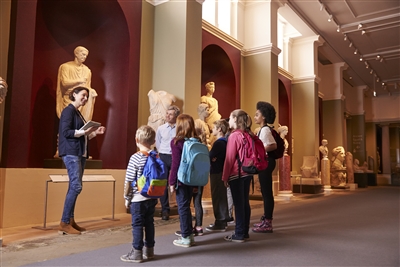Educational settings to help your students learn

Every tutor has encountered moments when they can`t inspire their students, times during lessons when they simply can`t engender their interest, nor inspire their understanding. At these moments the lesson will most likely come to a complete standstill, with no progress in the topic at hand seeming possible. At this point it can be beneficial to attempt a completely different strategy - to alter the whole method of teaching, to close the textbooks and computer screen, and seek help from external resources by taking the lesson outside. Students can benefit hugely by studying in different environments, by observing and exploring aspects of their syllabus in a setting that will facilitate their learning in a way a traditional lesson cannot. Here are just a few examples of different settings which can boost their knowledge, and heighten their interest in their subject.
1. Museums and other historical locations
If your student is studying history you might consider taking them to a historical venue contemporaneous with the period they are learning about. If for example they are studying the Tudor period you could take them to visit a Tudor building, show them any examples of late medieval architecture. Being in the presence of an actual historical building will make the subject come alive for them, allow them to appreciate that history is the study of real people and their lives.
The opportunity to conduct such a learning experience will of course be dependant upon your location - if you are located within a major city, the chances are there will be a number of buildings and artefacts that you can visit. Every town and village will most likely contain some historical buildings, even if they are only in fragmentary state, or incorporated into subsequent architecture.
Museums are of course another location for your student to observe a number of historical artefacts, and there will likely be information readily available with each exhibit, which you and your student can discuss.
2. Learning in nature
For students studying biology or physical geography, the outdoors has the potential to be particularly instructive. Various types of erosion may be seen wherever there is a river or cave formation, while woodlands and fields shall present wildlife and all manner of vegetation.
Ponds are the perfect place to collect a host of freshwater organisms . With with simplest of equipment (bottle or net) a sample of water can be collected, to be later studied under the microscope.
3. Commerce and Advertising
Simply visiting a shop can be an informative endeavour, for the tutor can point out the importance of product placement and advertising, along with how different items, such as perishable goods, need to presented to the customer in specialised cooling units. The student can learn about VAT, and how certain items (such as most food foods and medicine) are exempt. In supermarkets the price per litre, or price per KG will often be listed, and so this will be an effective way for the student to learn about efficient spending, and how superfluous and aggrandising packaging can disguise the paucity of product within.
4. Visit an airport
As unlikely as it may sound, an airport is a venue where many academic disciplines can be taught. By observing the departures board, and comprehending the relative journey length between different countries, the student can come to appreciate the scale of the planet on a practical basis. The close ties between different countries, on a cultural and economic level, can be learnt by the relative number of flights between them. Currency exchanges can also be discussed, along with the aerodynamic features of the very planes themselves.
5. Take a tour of the universe
A trip to the Planetarium will widen your student`s view of the world - quite literally - allowing them to appreciate the splendour and mystery of the universe, and their place within it. For any pupil studying physics or chemistry the trip will be hugely informative, as they will learn about the formation of heavier elements within stars, and the orbits of planets, each guided into elliptical orbits by the laws of circular motion.
Even just conducting a regular lesson outside may have benefits for your student. Removing yourselves from the stuffy confines of a building may be just the thing to help pique their interest, and engage their attention. Of course you will want to choose a setting that is congenial to study, one that is quiet enough for you to teach, and doesn`t have too many distractions. Once you find such a spot however, and should lessons there prove to be successful, you could make it a regular setting for future lessons.

 Add a Comment
Add a Comment